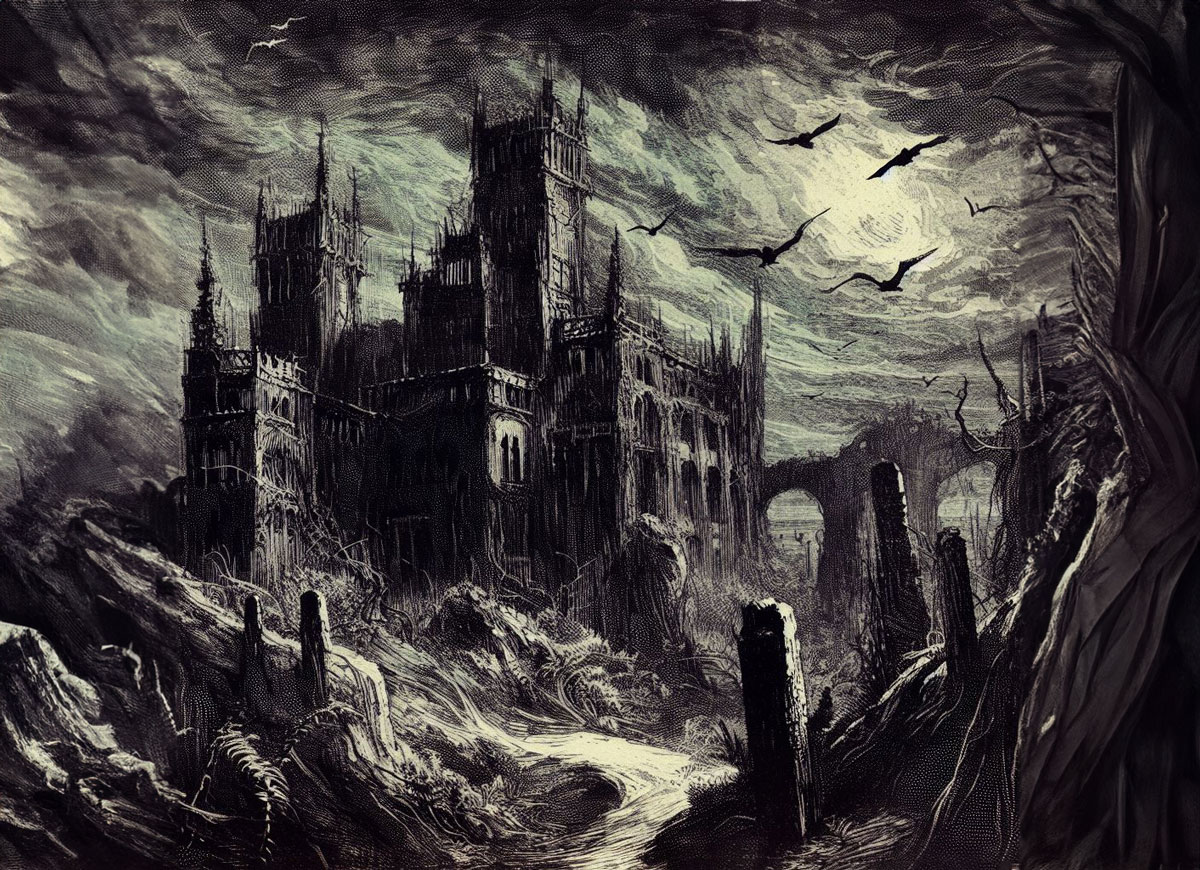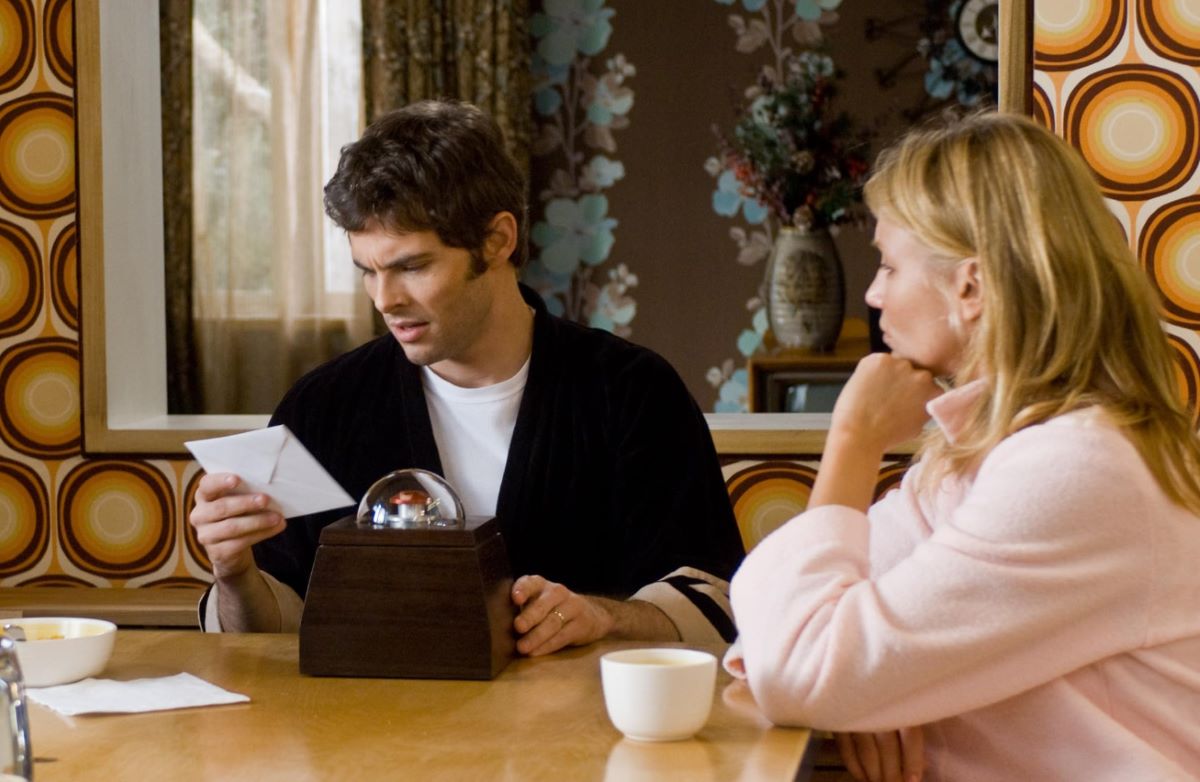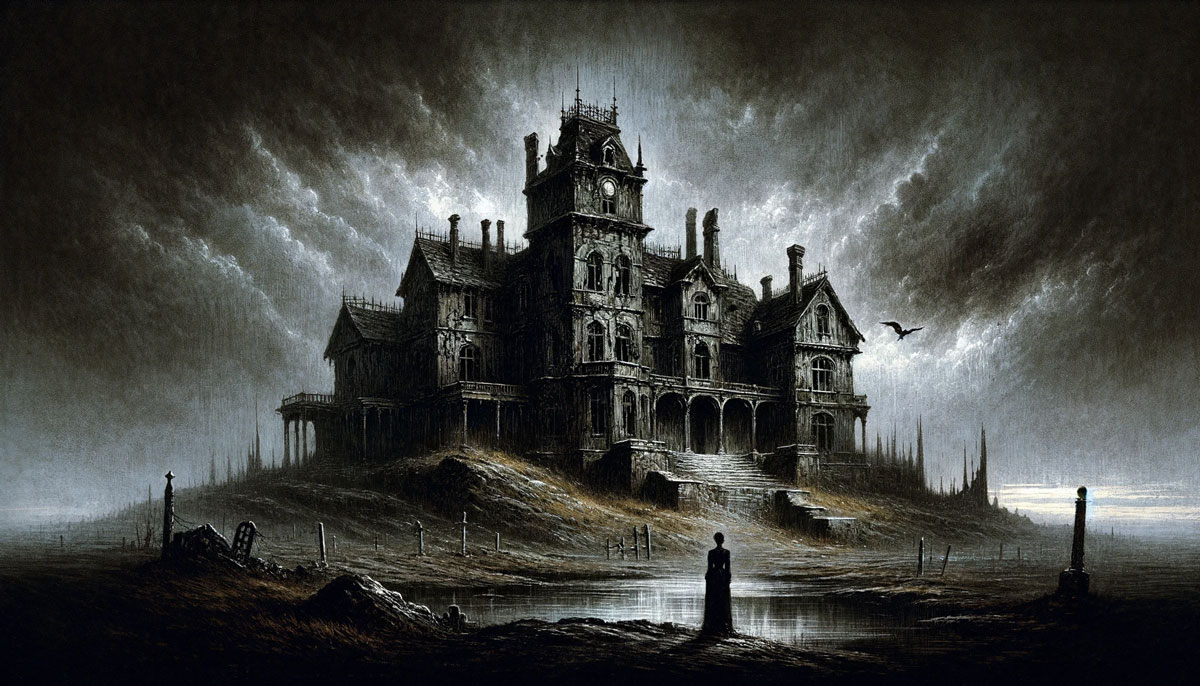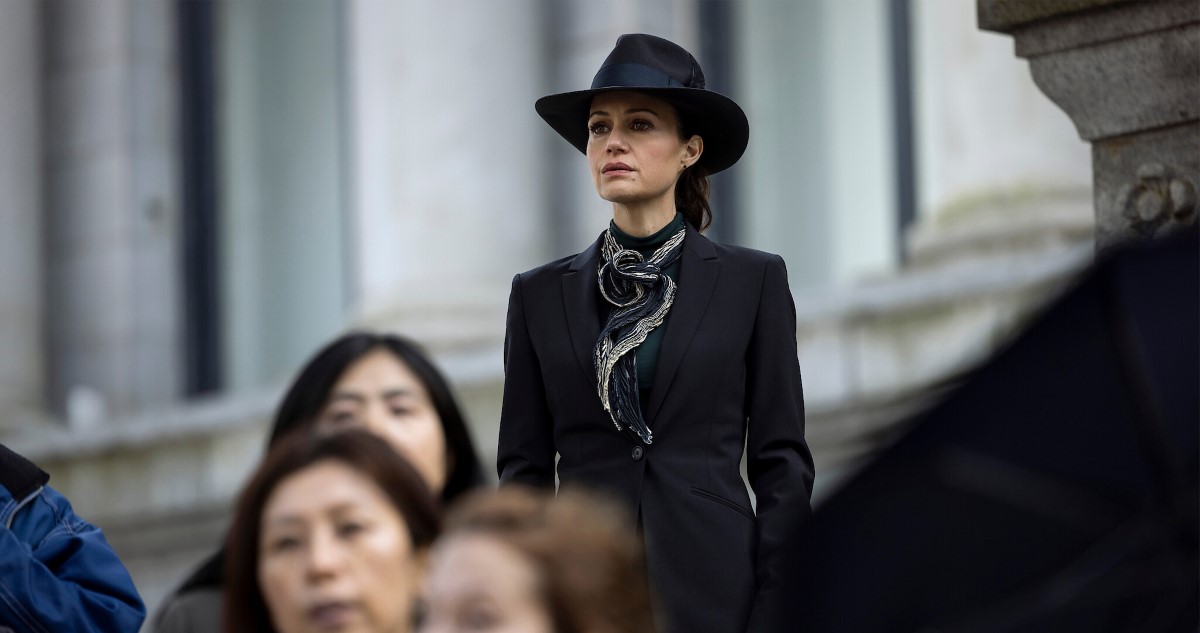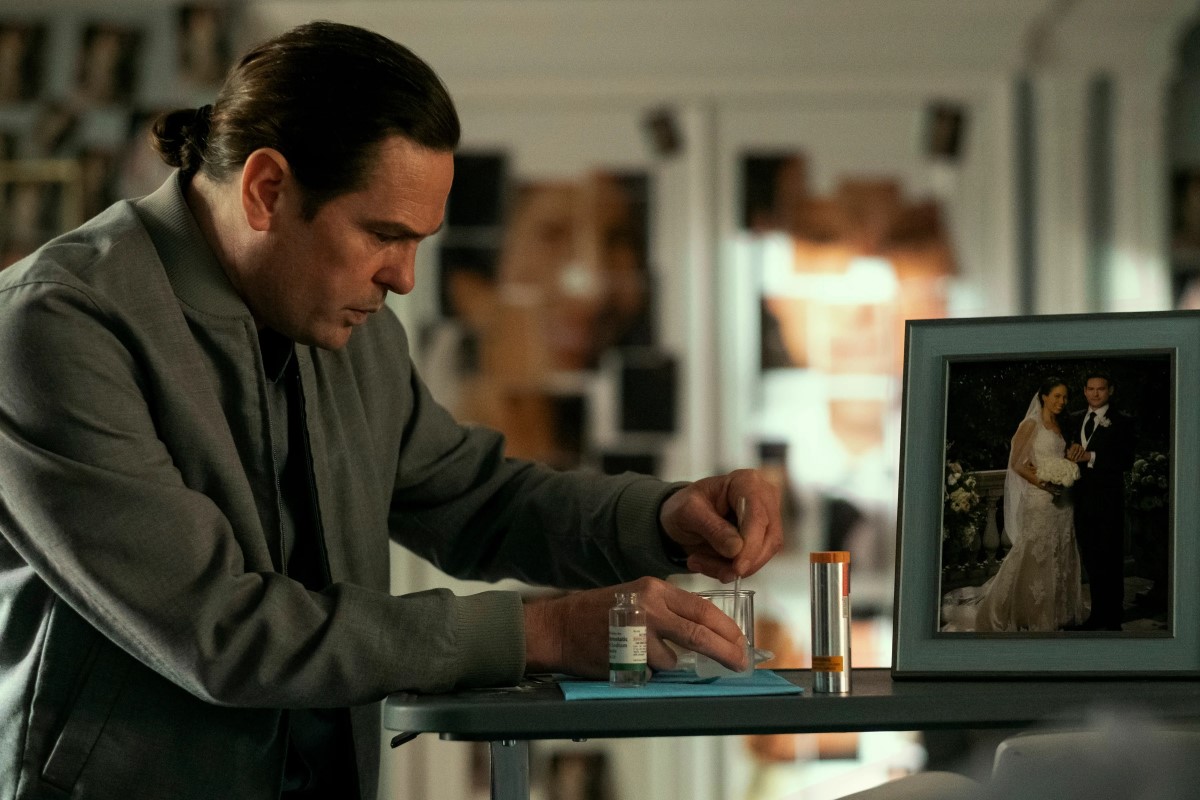by Daniel Hoffman
Although written in 1839 … ‘The Fall of the House of Usher’ seems a thesaurus not only of Gothic clichés but also of nearly all of Poe’s obsessional motifs; here joined together in a dazzling, garish, and intricately consistent pattern of concentric meanings. Because all tends toward the final annihilation, some critics have succumbed to the temptation to read the tale as a dramatization of Eureka [another Poe novel]. True, all of Poe’s tales partake of the same fixities which he so bravely schematized there, yet I do not believe that any writer of successful fictions undertakes to tell a tale in order to demonstrate his theory of the cosmos. On the contrary, he more likely is driven by the imaginative pressure of his fictions to construct such a theory that will justify and explain them….
In ‘The Fall of the House of Usher’ Poe completes what seems to me the tripartite division of functions in his most comprehensive and compelling tales. This is a fable of the soul: the soul acting independently, insofar as it can, insofar as it must, of mind, and struggling, as best it can, to be free, or, in the end, to become free, of the body.
Edgar Poe’s donnée was nothing if not peculiar, yet its peculiarities are expressed in an inherited vocabulary of truisms. Body, Mind, and Soul: the functions defined by Greek philosophy, by the medieval scholastics, in his use of philosophical and psychological conceptions, as of literary conventions, Poe puts clichés to startling new uses. The result is almost always weird. Yet his characters and their catastrophes, strange though they be, despite the narrator’s claim that he ‘could not, even with effort, connect [Usher’s] Arabesque expression with any idea of simple humanity,’ do touch our own simple humanity….
As is true of nearly all of Poe’s Arabesques, the form of ‘Usher’ is that of a confessional monologue…. By means of this contrivance Poe is enabled to endow his most subjective fiction with an air of objectivity: this is not a madman’s confession, but the report, by a sensible observer; of the dire predicament of someone else….
[As Richard Wilbur maintains,] ‘We must understand “The Fall of the House of Usher” as a dream of the narrator’s, in which he leaves behind him the waking, physical world and journeys inward toward his moi intérieur, toward his inner, and spiritual self. That inner and spiritual self is Roderick Usher.’ Let me support this assertion by pointing out how Narrator and Usher are brought together in the tale. Narrator refers to Usher as ‘one of my boon companions in boyhood’ and to himself as Usher’s ‘best and indeed his only personal friend.’ Nevertheless,
Although, as boys, we had been even intimate associates, yet I really knew little of my friend. His reserve had always been excessive and habitual. I was aware, however, that his very ancient family had been noted, time out of mind, for a peculiar sensibility of temperament, displaying itself, through long ages, in many works of exalted art and manifested, of late, in repeated deeds of munificent yet unobtrusive charity.
The Narrator
… To obey the summons of the boyhood friend who, in the subliminal allegory of this consistent plot represents his own unconscious, Narrator feels an overwhelming apprehension as he sees the House. Which is the House of Usher, the domain of his soul, into which he will be ushered. He feels this most keenly as he views its image, and the image of its zigzag flaw, in the dark tarn—as though Nature herself were offering an image like those proffered By art, as an exemplum of a truth more prophetic and more true than reality itself, which is apprehended only as an appearance.
Indeed, the appearance of the House, at its first glimpsing, is rendered by the narrator as though it were not an actual abode but a picture of itself. Brooding on the impossibility of analyzing his premonitions of woe, he says,
It was possible, I reflected, that a mere different arrangement of the particulars of the scene, of the details of the picture, would be sufficient to modify, or perhaps to annihilate its capacity for sorrowful impression….
But then he sees its ‘inverted images’ in the pool’s reflection, and shudders yet again. So the reflection becomes the image of an image. And that image is described, with careful consistency, in terms of a human head: ‘vacant and eye-like windows,’ the ‘web-like fungi’ resembling Usher’s ‘hair of a more than web-like tenuity and softness.’ Not surprisingly, the ‘House of Usher’ refers to ‘both the family and the family mansion.’ Once within the manse, Narrator is conducted ‘through many dark and intricate passages,’ reaching, at last, ‘the studio of the master.’ And this … is a chamber of crimsoned lights, of furniture, books, musical instruments in disorganized profusion. It is yet another symbol of the interior of a disordered mind….
Madeline
Once Narrator has arrived he learns, as though for the first time, that this boon companion of his boyhood has a sister. He sees her only once—‘While he spoke, the lady Madeline (for so she was called) passed through a remote portion of the apartment, and, without having noticed my presence, disappeared. 1 regarded her with an utter astonishment not unmmglcd with dread; and yet I found it impossible to account for such feelings.’
Does she really not notice his presence? For long, she has been sick, with an undiagnosed disease—‘apathy … wasting away … a partially cataleptical character’—but no sooner does Narrator set foot in her house than ‘she succumbed (as her brother told me at night with inexpressible agitation).’ Now she lies dying; later, as Narrator and Roderick lay her out in the vault downstairs, Narrator notices ‘a striking similitude’ between Madeline and Roderick. Now, for the first time, the brother murmurs that they are twins ‘and that sympathies of a scarcely intelligible nature had always existed between them.’…
No sooner does Madeline seem to be dying than Roderick becomes inconsolable, and he then commences—strangely—the only actions he instigates himself in this chronicle of the fall of his House. These actions are his artistic creations, for Roderick is a polymath of creative genius. The instruments which had lain disused upon the floor, the books scattered unattended in his studio, are suddenly put to use. Hitherto, Usher had been unmanned by his terrors—‘I dread the events of the future, not in themselves, but in their results’; he was immobilized by a superstitious conviction that the House, from which he never ventured forth, held an influence over his spirit; and by the thought of the evidently approaching dissolution—of a tenderly beloved sister, his sole companion.’ Now that Madeline at last is dying, what does Roderick do but burst forth with painted images, with song, with poetry!
Usher the painter is an artist of pure abstraction. ‘If ever mortal painted an idea, that mortal was Roderick Usher.’
A small picture presented the interior of an immensely long and rectangular vault or tunnel, with low walls, smooth, white, and without interruption or device … this excavation lay at an exceeding depth below the surface of the earth. No outlet was observed in any portion of its vast extent, and no torch or other artificial source of light was discernible; yet a flood of intense rays rolled throughout, and bathed the whole in a ghastly and inappropriate splendor.
Madeline’s Death
… After some time spent in reading (Usher’s ‘chief delight’ is the perusal of the rites for the dead), one night the host tells Narrator ‘abruptly’ that Madeline Svas no more.’ With precipitate haste he plans to inter her in a vault downstairs. Narrator assists as Usher places his sister’s body in this deep vault, which in feudal times had been used ‘for the worst purposes’ (doubtless as torture-chamber). It seems an image of the vault whose image formed the idea of Roderick Usher’s eerie painting. At last Madeline is laid out, the lid of her coffin screwed down, and the heavy door grates into place.
This vault, lined with copper, deep in the bowels of the House so interchangeable with its inmates, cannot help but suggest at-once a family tomb and an ancestral womb. In the event, Madeline is to rise again and reappear, as in a horrible travesty of rebirth. But we well know how strangely intercommunicable, for Poe, are images of suffering one’s death and dying into life. No wonder the vault in Roderick’s painting glowed with self-begotten light.
Now that Madeline is consigned there, Roderick’s composure disintegrates. ‘Some imaginary sound’ afflicts him. There is in the air a terror which reason cannot dispel. Narrator, too, is affected by ‘an incubus of utterly causeless alarm.’
Outside the House of Usher, Nature or supernature lends to the hysteria within the agitation of a whirlwind and the weird ‘glowing in the unnatural light of a faintly luminous and distinctly visible gaseous exhalation which hung about and enshrouded the mansion.’ Narrator dismisses these as ‘merely electrical phenomena,’ and to divert the terrified Roderick, commences to read aloud from one of his favorite romances, ‘The Mad Trist’ by Sir Launcelot Canning (an author invented by Poe). The passage he reads is
that well-known portion of the story where Ethelred, the hero of the Trist, having sought in vain for peaceable admission into the dwelling of the hermit, proceeds to make good an entrance by force.
And here, in a style of ‘uncouth and unimaginative prolixity’ so little adapted to ‘the lofty and spiritual ideality’ of Usher, follows the action of Ethelred, advancing through the storm to bash down the door and slay the dragon, which expires with a horrible shriek. While Narrator is reading this, Roderick becomes transfixed; for with his hyper-acute ears he is hearing a door being burst apart and a howling shriek echoing up the stairs from the vault below. With a preternatural conjunction between the text of the romance and the actions of the avenging shade downstairs—a conjunction which imposes the armor of allegory upon the denouement of the tale—while Ethelred is hacking his way in to the blessed place, Madeline is scratching her way out of her premature entombment. Yet the analogy is both obverse and exact, for, as will be seen, Madeline too is crossing the threshold of beatitude, escaping premature burial to enter the doorway, at last, of death, blessed death….
With his supersensitive hearing Roderick has heard everything—heard her vain scratchings of the copper sheaths, her feeble movements in the coffin, and now, intermingled with the heroic actions of Ethelred, her bursting from her coffin and thrusting apart the iron doors.
Have I not heard her footstep on the stair? Do 1 not distinguish that heavy and horrible beating of her heart? … Madman! I tell you that she now stands without the door!
… He cannot escape her vengeance now, as under ‘the potency of a spell,’ the panels of the door swung open ‘their ponderous and ebony jaws.’ There, with blood upon her white robes, stood ‘the lofty and enshrouded figure’… who, ‘with a low moaning cry, fell heavily inward upon the person of her brother, and in her violent and now final death-agonies, bore him to the floor a corpse, and a victim to the terrors he had anticipated.’
An Allegory of the Unconscious
I must try to gather up some loose strands of this eerie web-work. In the design of this fable, just as Roderick Usher is a double of Narrator—unconsciousness as an emanation of the conscious self—so is Madeline Usher the double of Roderick. Of these duplicate Ushers there is yet a further split, for the House itself is both the Usher family and its manse, as the bodily parallels and metaphors make plain.
Roderick, from the depths of a morbid depression brought on by doubts of his sanity, has summoned Narrator to his remote House, riddled with intricate subterranean passages. Of the lofty Madeline, Narrator, or consciousness, is, save for Roderick’s presence, wholly unaware. Now, enacting his desire to murder his beloved double, Usher inters her in a vault from which she forcibly bursts free, as though in a ghastly travesty of rebirth, in order to fall upon him, dead at last. The House collapses inward upon its inmates as inorganic matter dissolves with organic.
Madeline is Usher’s twin, his sister, his lover, and—but this is true only when he can think of her as dying—his muse. It is as though her dying is a precondition for the exercise of his creative impulse. The notion that the artwork outlives its subject is indeed an old one, but Poe makes the artist a cannibal or vampire whose subject must die so that there may be art….
Not even the unconscious self can cope with such knowledge, for which there is no forgiveness. Once Roderick has interred his sister beyond, as he thinks, hope of escape, his ‘lofty reason … totters’ and his creative spell is shattered. From this point comes the equivocal ending of ‘The Haunted Palace’ and his wild despairs. Unacknowledged guilt has broken him. Meantime, deep below in her sealed and cuprous vault, the body of his soul prepares to avenge herself by bursting forth to carry him with her into the final release of actual death.
‘The Fall of the House of Usher,’ then, is both a testament to the autonomy of the unconscious, by whose inexorable powers are revealed the deepest truths of the soul, and, like ‘Ligeia,’ a fable of the one strange love story which was Poe’s doom and gift. A love story in which incest, murder, and necrophilia are inescapable. To love one’s twin sister is but a double displacement for the ultimate narcissism, self-love, and the ultimate incestuous desire, possession of one’s mother’s body. But in this strange domain from which all thought of ethics is banished as though by law by an aesthetic law—there is yet, despite all, the sway of a moral law. There is even here the invisible reign of that most ancient tabu, inspiring guilt and terror. In the archaic memory of the author, from which these terrible fantasies have risen, the image of the beloved is so inextricably enshrouded with the image of her death that his figure of the unconscious must doubly punish himself, imagining not only that his beloved twin and sister is dying or dead, but making himself responsible for her dissolution. His guilt is doubled, too, for not only does he become her murderer, he has done this terrible thing in order to make her ‘lofty and enshrouded figure’ the more completely correspond to his own desire. His erotic needs are subsumed in his art-products. His guitar rhapsodies, his poems, his paintings, all these can come into being only when his love-object exactly fits the imperious demands of his deepest wish. But that wish makes him the committer of both incest and murder, and his ‘lofty reason’ must topple from her throne….
An Apocalypse
I have but to underline the obvious source of Roderick Usher’s self-immolating course of action: What caused him to put his sister living in the tomb? What but his inescapable Imp of the Perverse, willing his own destruction on the instant and through the mechanism of making him will hers. As she falls inward upon him, their House, whose zigzag fault may represent the inorganic impulse toward self-annihilation, falls inward upon them both, and the entire House of Usher, the living, the dead, and the unliving, sink beneath the primal waters of the tarn in a landslide like that of the City in the Sea. A total apocalypse, from which but one character—Narrator—escapes to tell the tale.
Narrator is usually taken to be a blockhead, for he seems stupid indeed to accept so unquestioningly so many strange doings in the household of his host…. Poe seems to me to be telling us that consciousness alone cannot understand the inexorable donnée of the unconscious, but also that the unconscious, if unaided by consciousness, is the victim of the very forces among which it dwells. Why else does Roderick at the outset send for Narrator to join him, but that Usher fears he is losing his reason? What Poe further tells us is, those forces which the unconscious knows but cannot control are so strong that the conscious mind, even when made aware of them, cannot do much to direct them either.
This latter inference is both borne out and belied by Narrator’s tale, for what is the effect of his telling his tale but to control these very forces which, the tale says, overwhelm Roderick Usher? The tale begins by proposing that the harmonious collaboration of Narrator-plus-Usher, i.e. of the conscious and the unconscious, will have a therapeutic effect upon the latter in its extremity. By the end, we have, not, I think, ‘catastrophe without tragedy,’ but a tale of the personal apocalypse of the unconscious, as told by the conscious mind. Now it is true that Narrator is a bit dim, that in the eerie monde intérieur of Usher’s House he functions with the insight of a Prefect of Police. But in his own house how does he function? He tells the tale in which we learn all this. I take that tale itself to be the result of the collaboration between the Narrator-portion and the Usher-meed of the author’s own mind. It is the result of a harmonious collaboration between his conscious and unconscious mind.
Thus Narrator is both inside and outside the catastrophic events of which he speaks. By separating the body that dies from the soul that suffers and creates, and the suffering soul from the mind that ratiocinates, Poe has managed to escape the fate that overtakes Roderick Usher as a result of this same division of functions. For Poe, as Narrator, is outside the apocalypse, observing that in which he took a part as did God in Ligeia’s poem The Conqueror Worm,’ or in Poe’s own Eureka.
Thus just as the several art-works within the tale are epitomes of the whole, so Roderick’s action in creating them are epitomes of the author’s in creating the tale of which they are among the parts. I speak now of Poe as author, no longer of Narrator, the character who tells the story, because I must rejoin those faculties in Poe which Poe has separated in Narrator and Usher: consciousness and intuition. These two qualities are exhibited in Roderick only while he functions as an artist. Before his creative streak which the presence of Narrator and Madeline’s attendant sickness instigated, he was distraught. After reciting The Haunted Palace’ he is overpowered by the ‘evil things’ the poem foretold—his own destructive impulses. Narrator, for his part, has no tale at all to tell save for the materials which his trip to Usher’s domain had made available to him. Little though he consciously understands those experiences, in his telling of the tale we see the collaboration of Usher’s intuitive power with Narrator’s conscious mind. Like so many other of Poe’s tale-tellers, his art-product transcends his own limitations to exhibit a design of which he is scarcely aware. The art-product which proceeds according to the principle of the economy of the means, and toward the predetermined end of exciting the beholder’s soul, is imputed to Roderick Usher’s improvisations. But it is enacted in the tale of the Fall of the House of Usher.
Creative intelligence, then, the fusion of intellect-cum-intuition, is, in the artist, the musician, the poet, a power which transcends the materials upon which it exercises its will and imposes its design. Like God, the artist is both embodied in and apart from the destruction of the creatures of his will. Like God, he outlives the annihilation of his self- created universe and can at will construct another plot containing yet again the necessity of its own destruction. Solipsism, in thought, in art, in life or death, can go no further than this….
The Hero as Artist
The story offers Usher as a paradigm of the hero as artist, of the artist as isolato, of art as prophecy, of prophecy as burdened with doom. All this, though elaborated from Gothic clichés already tired by Poe’s own time, strikes the thoughtful reader today as peculiarly modern. It is a form of our own anguish which is limned in these outlandish pages.
More generally, it is the grip this tale has upon the emotion of the uncanny which chills us. However repulsive one finds Poe’s Gordian knot of incest, inhumation, murder and madness, his plot yet touches some unadmitted chord deep within us. It is akin to that almost forgotten knowledge toward which Poe’s mariner rushed on his spectral ship, that nearly-recollected wisdom enshrined in Ligeia’s eyes. Basing his investigation of ‘the uncanny’ upon an analysis of a tale by E.T.A. Hoffmann, whose work was among Poe’s models, Freud proposed
that we are able to postulate the principle of a repetition-compulsion in the unconscious mind, based upon instinctual activity and probably inherent in the very nature of the instincts—a principle powerful enough to overrule the pleasure-principle…. Whatever reminds us of this inner repetition-compulsion is perceived as uncanny.
Unusual as are Poe’s particular obsessions and compulsions, the attachments of which they are vacant forms and the instincts which they embody are the common properties of our human inheritance. Thus Poe, out of the very peculiarity of his psychic makeup, speaks to us not as a psychotic but as a man. Few writers have lived with their unconscious pulsations so close to the surface of their skins. Few have been as able to summon these images, or been as unable to escape them, as was Edgar Poe.
Excerpted from Poe, Poe, Poe, Poe, Poe, Poe, Poe by Daniel Hoffman (Marlowe & Co., 1997). Copyright 1972 by Daniel Hoffman.
* * *
House of Dread
This excerpt from “The Fall of the House of Usher” begins with the narrator’s approaching Roderick’s house, revealing Poe’s use of symbolism: Roderick’s house resembles a person.
I looked upon the scene before me—upon the mere house, and the simple landscape features of the domain—upon the bleak walls—upon the vacant eye-like windows—upon a few rank sedges—and upon a few white trunks of decayed trees—with an utter depression of soul which I can compare to no earthly sensation more properly than to the after-dream of the reveller upon opium—the bitter lapse into every-day life—the hideous dropping off of the veil. There was an iciness, a sinking, sickening of the heart—an unredeemed dreariness of thought which no goading of the imagination could torture into aught of the sublime. What was it—I paused to think—what was it that so unnerved me in the contemplation of the House of Usher? It was mystery all insoluble; nor could I grapple with the shadowy fancies that crowded upon me as I pondered. I was forced to fall back upon the unsatisfactory conclusion, that while, beyond doubt, there are combinations of very simple natural objects which have the power of thus affecting us, still the analysis of this power lies among considerations beyond our depth.

